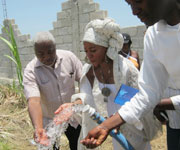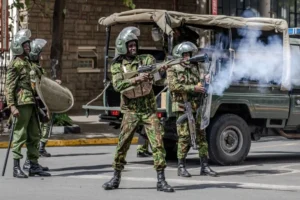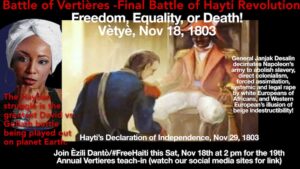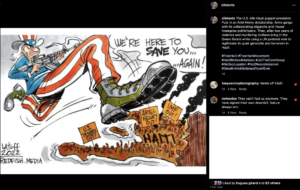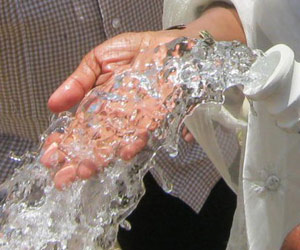Haiti rape victim tell McClelland: I said “NO,” you had no right to speak of my story, I did not give you authorization (One of Haiti’s most famous writers relay message for the twice victimized victim)

Edwidge Danticat Speaks on Mac McClelland Essay
by Edwidge Dandicat, July 8, 2010, Essence Magazine
(See also [ezilidanto] Ezili Dantò on IJDH’s the legal rep resentation of Haiti rape victims, erzilidanto, 07/10/2011)
At the risk of prolonging a contentious debate concerning this essay by Mother Jones magazine reporter Mac McClelland, I would like to add another voice to the conversation.
Earlier this year, I met the woman that Ms. McClelland has called both Sybille and K* in her writings.
I met her at a meeting for rape survivors in Port-au-Prince. She is a 25-year-old mother of three children. She has a beautiful singing voice and often sings in talent shows to inspire other rape survivors.
This incredibly brave and talented woman speaks Creole, French and Spanish. She learned Spanish while traveling between Haiti and the Dominican Republic to buy grocery items, toiletries and non-perishables that she would then resell in Port-au-Prince.
She lost the father of her older children to illness before the earthquake and lost the father of her youngest child on January 2010, during the earthquake. She also lost her home, which is how she ended up living in the camp where she was raped.
In her essay, Ms. McClelland writes that K*’s trauma led in part to her own breakdown. Nevertheless, during Ms. McClelland’s ride along with K*, on a visit to a doctor, Ms. McClelland, as has been reported elsewhere, live-tweeted K*’s horrific experiences. The tweets put K*’s life in danger because they identified the displacement camp where K* was living–with details of landmarks added–her specific injury, her real name, and suggest that she is a drug user.
When K* found out about Ms. McClelland’s tweets, even before Ms. McClelland’s
original Mother Jones article was published, K* wrote a letter to Ms. McClelland and Mother Jones magazine asking that Ms. McClelland not write about her. Her lawyer emailed the letter to them on November 2, 2010.
The full text of the letter in K*’s own handwriting is attached and is written in Haitian Creole. It says:
You have no right to speak of my story.
You have no right to publish my story in the press
Because I did not give you authorization.
You have no right. I did not speak to you.
You have said things you should not have said.
Thank you
Ms. McClelland has stated on this same twitter account that she had K*’s
permission and K*’s mother’s permission to ride along with them, but she
certainly–according to K*’s lawyer, and the driver on the ride along, and K*
herself–did not have K*’s permission to tweet personal and confidential
information about her. And even if Ms. McClelland in some way thought she had
K*’s consent, the attached letter should have made it clear that it was
withdrawn and that she had, as the letter states, “no right” to write about K*
anymore, especially in ways that her previous tweets had made K*’s and her
location easily identifiable.
I have K*’s permission to publish this letter and to talk about K* because she
is angry at the way Ms. McClelland has portrayed her in the tweets, has ignored
the wishes of her letter and continues to make K* part of her story.
This week, K* wrote me an e-mail from Port-au-Prince saying, “I want victims
in Haiti to know that they can be strong and stand up for their rights and
have a voice. Our choices about when and how our story is told must be
respected.”
She closed her note by adding, “Se wozo nou ye,” citing an irrepressible reed,
which grows, in spite of impossible conditions, on the side of Haitian rivers.
“We are wozo,” K* writes. I agree.
Many have applauded Ms. McClelland’s courage, while showing little
consideration for K*. However, faced with extraordinary obstacles, to which one
should not add other types of exploitation, K* and Haiti’s other rape
survivors, have had to be more than courageous. They’ve had to be wozo.

Edwidge Danticat is a Haitian-American writer living in Miami, Florida.
*****************
This comment was posted in the comment section on Edwidge Dandicat’s essay for Essence.
I am the attorney for K. I have represented her since the day after she was ***aulted and have seen her every two months since then. I will see her in Haiti again tomorrow and I have her permission to post this comment.
I disagree with the representations in the “comments” posted above by the editors of Mother Jones and Ms. McClelland. Rather than rewrite history, I will simply copy and paste an email I sent to the editors on September 30, 2010, which captures my perspective and is the culmination of a series of shorter emails aimed at protecting K’s privacy. I have redacted the name of one of my colleagues for privacy’s sake. I have redacted confidential portions of the email that would put K at risk if published.
——————————————————————————–
“From: Fleming, Jayne
Sent: Thursday, September 30, 2010 6:16 AM
To: ‘mbauerlein@motherjones.com‘; **; ‘bauerlein@motherjones.com‘
Cc: ‘cjeffery@motherjones.com‘
Subject: Re: Response from Jayne Fleming
Dear Monika,
I am in Philadelphia with a very intense schedule this week. I will then be in Haiti for five days and then back in California. Let me try and make several points:
I have devoted a decade of my practice and many more years of my life to supporting and protecting rape survivors from further trauma. The overwhelming experience of a rape victim is powerlessness. My goal in my work is to restore that lost sense of power and control. I do this not only through legal representation, but by protecting a victim’s privacy, security and public exposure. I am VERY careful to set ground rules when I work with reporters and I have worked with many, including in Haiti. I thought I had set these rules with Mac when I asked her (through Alain) to speak with me before writing about my clients. I have never in ten years had a reporter violate such a verbal agreement. Ironically, I just spent several days “fact checking” another story on Haiti for a major CA publication and they did not find this an inhibition on their journalistic integrity. They felt it enhanced the accuracy of the story and protected the interests of my clients. This is routine practice in my work with reporters because my work always involves trauma and crisis. I do not insist on reading copy. I insist on discussing confidentiality and privacy issues in rape and torture cases before stories run. No reporter has ever protested this.
I give Mac the benefit of the doubt and ***ume there was a misunderstanding of my expectations. However, let me clear up any confusion on some issues now.
I never affirmatively invited Mac to cover the lives of my clients. I have never in ten years solicited media in a case. I have sometimes allowed it, but always with the best interest of my clients in mind. My understanding is that Mac sought out the stories she intends to report by contacting Favilek and Alain. She asked Alain if she could ride along with him as he escorted victims to me***al care. Alain called me and asked my permission for this. I said it was okay on the condition Mac talk to me BEFORE writing about our clients.
Mac never suggested she would be giving play-by-play “tweets” of painful and confidential information about our clients throughout the day as she rode along with Alain. Had I known this was her intent, I never would have given her (or any reporter with these intentions) access to my clients.
To put it bluntly, I find the “tweet” media wholly inadequate for meaningful reporting about rape in Haiti. It may be provocative for readers outside of the disaster zone, with no historic grasp of gender based violence there, and no sense of imminent danger to their own life, but it is destructive and potentially life threatening for victims in Haiti.
Identifying a Haitian rape victim by name, geographic location and physical description in a tweet, all of which Mac did, places a victim in extreme danger in Haiti. I have personally placed more than a dozen women in safe houses there because they faced death threats for publicly revealing they were raped or helped another rape victim. These women have no police protection. They have no access to justice. They live in constant terror.
So does K*, which was obvious to Mac when K* saw the rapist on the way back to her camp and dove to the floor of Alain’s vehicle. Rather than considering K*’s emotional condition and safety, Mac described the man in a tweet. She then identified the exact location of K*’s camp, describing it as “rape central” for added impact. Yes, the camp is one of the most dangerous in Port au Prince. Did it occur to Mac that perhaps that provided reason for caution in reporting on and identifying a victim from there?
Mac rationalized revealing K*’s name and other identifying information, post-tweet, by pointing to local Haitian journalists who had already used K*’s name on television. She failed to mention that Alain had already told her how dangerous this reporting was to K*. Furthermore, I ***ume Mother Jones is a leader rather than follower with respect to standards on confidentiality in rape cases. Apart from this, I had an agreement with Mac aimed at protecting K* and it was not pre***ated on what local reporters had or had not done. I know we disagree on the scope of this agreement, but I feel it was violated for the sake of tweeting in the heat of the moment. I never agreed to this approach.
Beyond the safety issues and violation of my understanding of our agreement, however, I feel compelled to ask, how could this tweet possibly capture the whole story? What, for instance, was gained by adding that one rapist **************** other than pure shock value? Sadly, this gruesome detail makes K* easily identifiable as the victim (how many others in her camp **************?), which puts her at risk.
And what was gained by stating K* was verbally accosted by a doctor who accused her of ***** and bearing the blame for the rape? Was that protective of K*’s privacy? Did it enhance her legal case? Did it consider her legal interest in seeking to prosecute the rapist? Did it consider that it took a week to find a doctor in Haiti willing and able to provide emergency care?
Yes, the doctor was out of line in her comments, but the one line tweet bashing this doctor was hardly complete reporting. Did Mac, for example, interview members of the Haitian National Police or other Haitian organizations that share responsibility for this cultural blame-the-victim at***ude? Perhaps a discussion of deeply entrenched Haitian at***udes about rape and the shame attached to it would have been more illuminating than a one-line tweet that hurt rather than supported K*.
I read all of Mac’s tweets last night. I see she also threw in a one-liner about one of my clients who died last week. Mac did not have my permission to write about this client. Nor does one line even begin to tell the story of our eight month effort to help this woman, which is a story I will not share in detail lest it appear in print without my permission.
Mac refers to Alain in another tweet as “her driver” and even brags about giving him an exorbitant tip. That is simply false reporting. He was not her driver. She was shadowing him in his work as a project director working on a project for me.
There are other inaccuracies: She refers to my safe house project and says an NGO offered K* a house but it was too far away. I offered K* the house. I am not an NGO.
She provides a link to Favilek as the organization paying for K*’s care. Although I appreciate the support for Favilek, I pay for K*’s care with private funds I have raised in the U.S. If Mac had called me before writing her tweets, they might have been accurate.
I could go on, but it seems pointless. The truth is I am distrustful of any story about my clients because of the damage that has already been done. I ***ume you will print what you want, but it will be without my consent. I hope you will have the professional ethic to leave out names, locations and facts that would identify victims or witnesses and put them at risk.
In closing, everything in this email is confidential and may not be printed, tweeted, blogged or shared in any medium. If you still feel a call is needed, I am free at 2:00, as is **.
Jayne E. Fleming”
Sadly, nine months after I sent this email the debate about Ms. McCelland’s reporting on my client is still raging and K is still exposed and traumatized. I hope that those who are concerned about K will find a way to conclude the debate and allow her to finally have peace.
Read more: here
*
(See also [ezilidanto] Ezili Dantò on IJDH’s the legal rep resentation of Haiti rape victims, erzilidanto, 07/10/2011)
*********************************************
Forwarded by Ezili’s Haitian Lawyers Leadership Network
*********************************************
BACKGROUND LINKS:

Recommended HLLN page on, Genius Award author, Edwidge Dandicat
**********
[ezilidanto] How Violent Sex Helped a Haiti “journalist” get over her Haiti experience:
White Narcissism knows no bounds in Haiti “reporting”, erzilidanto, 06/30/2011
[ezilidanto] Can you get PTSD for rape from seating next to someone shouting at her rapist?, erzilidanto, 07/07/2011
On McClelland’s narcissistic stress cure:
“What would happen if every lawyer, every soldier, every policemen, every
firemen who covers an incident wanted to re-enact the murder, re-enact the war,
re-enact the shooting, re-enact the fire to cure their stress?
How about earthquake journalist who covered Haiti earthquake get to drilling
the earth to violently re-enact an earthquake to cure their vicarious trauma…
make it real with some amputated limbs and crush heads, will ya?” – Ezili Dantò
The Two Most Common Neocolonial Storylines about Haiti (2007/Ezili Dantò)
****
See also
[ezilidanto] Ezili Dantò on IJDH’s the legal rep resentation of Haiti rape victims, erzilidanto, 07/10/2011
Add a comment:
Powered by Facebook Comments

